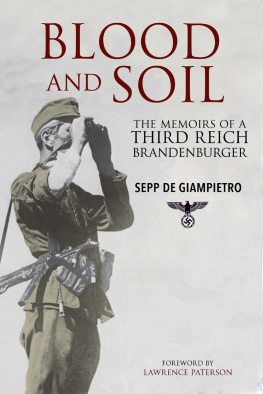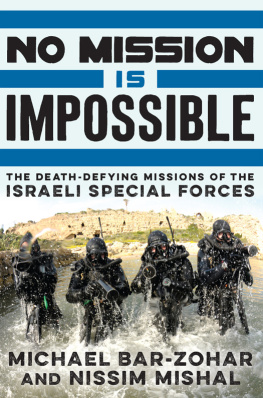Pagebreaks of the print version

Blood and Soil
B LOOD AND S OIL
T HE M EMOIR OF A T HIRD R EICH B RANDENBURGER
Sepp de Giampietro
Translated by Eva Burke
Introduction by Lawrence Paterson
Blood and Soil: The Memoir of a Third Reich Brandenburger
Greenhill Books, c/o Pen & Sword Books Ltd,
47 Church Street, Barnsley, S. Yorkshire, S70 2AS, England
For more information on our books, please visit
or write to us at the above address.
Copyright Sepp de Giampietro, 1984
Eva Burke English translation Greenhill Books, 2019
Lawrence Paterson foreword Greenhill Books, 2019
The right of Sepp de Giampietro to be identified as the author of this work has been asserted in accordance with Section 77 of the Copyrights Designs and Patents Act 1988.
PUBLISHING HISTORY
Sepp de Giampietros memoir was originally published under the title Das Falsche Opfer? by Leopold Stocker Verlag, Austria in 1984. This is the first English-language edition and includes an introduction by Lawrence Paterson.
CIP data records for this title are available from the British Library
ISBN 978-1-78438-341-1
eISBN 978-1-78438-342-8
Mobi ISBN 978-1-78438-343-5
Introduction
Lawrence Paterson
Of all the special forces that saw action during the Second World War, few are as misunderstood as Germanys Brandenburgers. The years between 1939 and 1945 saw the advent and blooding of many variants on the covert commando theme for which Britain became most famous: Churchills beloved butcher and bolt troops that began formation in 1940 following the British defeat in France and then developed into a ferociously effective new weapon in the Allied arsenal. However, they were predated by the Abwehrs Brandenburger troops, who had already contributed in no small part to Germanys triumph in the West by employing a combination of deception and ruthless combat skills. Yet, by the very nature of the tactics and methodology which the Brandenburgers employed, they remained an elusive and mysterious organisation of which little was known or celebrated. Though components of this famed unit included paratroopers, marines, light infantry and mountain troops, they frequently operated under cover of other unit designations, or in full disguise as enemy soldiers.
As the war years dragged on and Germanys forces were remorselessly ground into virtual oblivion, the Brandenburger units gradually lost their purpose, until employed as spearhead assault troops with correspondingly severe casualty rates. Though effective light infantry, the specialised covert infiltration techniques with which so much Brandenburger success had been gained previously were subsequently rarely required in a war that had become a defensive struggle on every front. Finally, the original core of the Brandenburgers fractured and men were either relegated to Panzer Grenadier status or absorbed into the Waffen SS, which had been struggling to establish its own mirror unit, illustrating the inter-service rivalries that so bedevilled the Third Reich and its military.
I have always found the Brandenburgers fascinating and was fortunate to be given the opportunity by Michael Leventhal at Greenhill Publishing to write what I hoped would be a thorough account of this most unusual unit. For the contemporary student of the Third Reichs military history, such as myself, untangling the web of misinformation regarding the Brandenburgers was difficult, to say the least. What wartime records remain are often fragmentary or cloaked in cover names, leading to frequent misdirection and confusion. Many operations attributed to the Brandenburgers were either non-existent, or in fact carried out by other units of the Abwehr or SS. In some cases, the Brandenburgers became a catch-all training establishment for agents who were employed by other agencies despite having briefly been identified as belonging to the Brandenburger Regiment. Sifting the fact from fiction is as frustrating as it is fascinating.
Consequently, a personal account such as this written by Sepp de Giampietro is invaluable to increasing our understanding of the Brandenburgers as a whole. It is an enthralling tale that begins in 1938 in the small South Tyrolean town of Sterzing that lay a stones throw from the Austro-Italian border, within the Alps and near to the Brenner Pass. From there De Giampietro emigrated to Berlin after the anticipated incorporation of South Tyrol into the Greater German Reich failed to materialise. Instead South Tyroleans were granted the choice of emigrating from their homeland to Nazi Germany or remaining part of fascist Italy; De Giampietro arrived in Berlin during 1940 determined to soon be in German mountain trooper uniform.
His and his fellow Tyrolean comrades enlistment in the Wehrmachts mountain troops leads unexpectedly to membership of the Lehrregiment Brandenburg zbV 800 of which, at first, he appears alternately perplexed and apprehensive. His commanding officer Siegfried Grabert plays a key role in the settling of this young recruit into his new military career and the book provides an illuminating glimpse inside Graberts own motivations. The chapters that follow offer an unvarnished account of action as a Brandenburger: De Giampietros active service as a member of the 8th Company beginning in Romania, guarding the Ploesti oil wells, before being committed to combat during the invasion of Yugoslavia and Greece. From there he became embroiled in the covert bridge seizures at the spearhead of Operation Barbarossa: Hitlers all-out gamble as he ordered the Soviet Union invaded. For the following two years De Giampietro took part in some of the most momentous actions on the Eastern Front before being withdrawn from the front line for promotion to the officer rank of Leutnant and a return to the Brandenburgers, now stationed in Greece.
The unit which he rejoined had expanded to divisional size and yet was a shadow of its former self now committed to action as standard light infantry assault troops. Despite preserving elements of the esprit de corps that had permeated the Brandenburgers since their inception, disillusionment with the war itself had already taken root within De Giampietro. The war bore no justification, he writes. I suddenly realised this truth, and all its implications, and I was filled with profound sadness. Nonetheless, he fulfilled his duties with the professionalism of an experienced veteran until, in December 1943, Sepp de Giampietro was badly wounded during the savage fighting against Titos partisans in Montenegro as part of Operation Kugelblitz. The end of his war and subsequent attempts to return to his homeland from the ruins of a defeated Germany finish what is surely one of the finest first-person accounts of action as part of the Brandenburgers. Sepp de Giampietro paints detailed portraits of many of the units most important luminaries, including his commanding officers Siegfried Grabert and Hans-Wolfram Knaak, both of whose names are synonymous with the height of the Brandenburgers achievements and both of who were killed in action within the Soviet Union.
Concurrent with the detailed description of pivotal battles fought by him and his comrades, Sepp de Giampietro also provides a captivating insight into the mindset of a Tyrolean member of Hitlers Greater German Reich. The complexities of national identity carried by people born in territory deemed Italian since the end of the First World War, but who had remained steadfastly Austro-German, is extremely interesting. This provides further insight into the complex motivating factors of many citizens of the Third Reich who willingly followed Adolf Hitler into the inferno of total war and eventual destruction. Though clearly not a politically driven man, Sepp de Giampietro nonetheless felt an irresistible connection with Germany that defined his choices in life.













